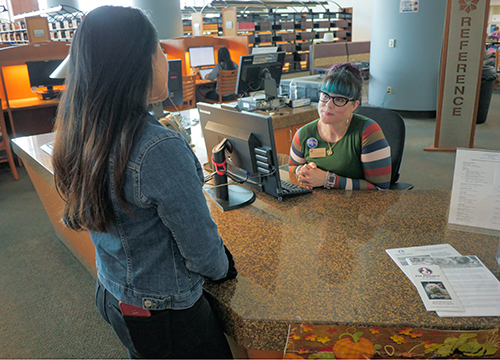Our newest full-time librarian Gracie McDonough is keeping busy learning and teaching about open educational resources. We’ve interviewed her regarding OER and what she’s doing to help faculty and students in this area.
How would you define OER? What can you tell us about its benefits and potential?
OER (Open Educational Resources) are free and openly licensed educational materials that can be used for teaching, learning, and research purposes. There is a multitude of different OER materials including textbooks, test banks, videos, discussion questions, and other resources that are available to build a class without having to start from scratch. The biggest benefit of OER is that it is a low-cost, and often no-cost option for students. It’s an alternative instead of having to spend hundreds of dollars on a textbook. Students often have to wait for financial aid to come through to be able to purchase the book in the first place, which can put the students weeks behind in a class. With OER, they have immediate access to the online texts for the class. If they do want a physical copy of the textbook it can be purchased for the cost of the materials, usually around $25. One benefit for faculty is that an open license means that the instructor is able to adapt the text so that it specifically fits the needs of the class and then it can be redistributed with no or limited restrictions.
You’re also leading an OER Convocation session this spring! What can faculty expect from this CAPE session, and where and when will it take place?
Paula Michniewicz, from the Department of eLearning, and I have been working to put together this session. It is a panel of both students and faculty that have used OER texts in their classes. Multiple studies show that students in classes using OER texts are more engaged and have the same or higher completion rates. We want faculty to hear from CSN students about their experiences in OER classes. The faculty will be asked questions about how easy or difficult it was for them to find and/or edit texts for their classes, along with examples of how their classes have changed since adopting OER. This session is called, “Are you Open to Open?: Different Perspectives on the Impact of Student Success using OER.” It takes place on Wednesday, Jan. 15 from 9-10:30 a.m. at West Charleston campus, room C-115.
What is the CSN OER Task Force?
The Open Educational Resources (OER) Task Force’s purpose is to support the College of Southern Nevada’s Students First, Student Success agenda through the evidence-based strategy of increasing the use of OER to decrease students’ costs and improve access to course materials. The task force’s charge is to increase awareness about OER’s benefits, to support faculty in adopting, adapting, and creating OER, and to develop and improve CSN’s OER use infrastructure. The task force draws on the energy, insight, and creativity of a broad coalition of members including CSN students, staff, faculty, and administrators. More information can be found on the CSN OER website.
You were recently accepted into the Open Textbook Network’s program for a certificate in OER Librarianship. How will this program help you help faculty and students?
This Certificate in OER Librarianship will give me formal training, a community of peers, and expert mentors in order to create sustainable, collaborative, and effective OER programs at CSN. I will learn how to build and sustain momentum with campus constituents, as well as provide support for building multiple layers of faculty engagement, including OER adoption, creation, editing, and teaching strategies. I am looking forward to being able to help faculty in these areas.
What advice do you have for faculty who are curious about trying OER?
The easiest thing that an instructor can do is adopt an OER textbook through a source like OpenStax, OER Commons, Open Textbook Network, Community College Consortium for Open Educational Resources (CCCOER), Lumen Learning, and many more. I mentioned earlier that instructors can edit textbooks to make them better suited for their classes, but this isn’t something they need to do. Adopting an OER textbook can be as simple as getting a book from a publisher. Editing is just a perk that can used if needed. Faculty can also join CSN’s OER Task Force. Learn how to join on the CSN OER website too!



